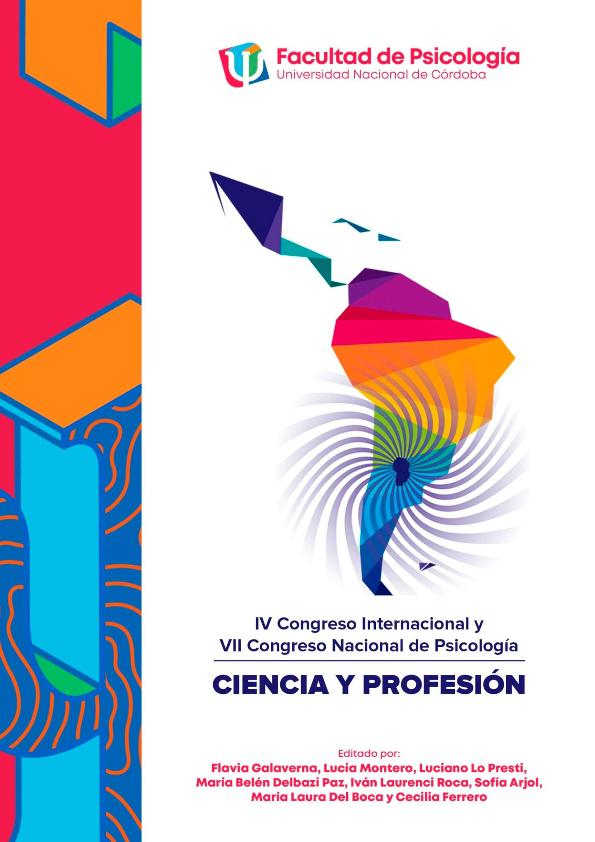Evento
Introducción: Las expectativas hacia el alcohol (EA) y los contextos de consumo (CC) pueden ser relevantes en la regulación de la ingesta de bebidas alcohólicas en jóvenes. Objetivos: Evaluar asociaciones entre el consumo semanal de bebidas alcohólicas y a) las EA positivas, b) las EA negativas y, c) los CC (facilitación social, aceptación del grupo de pares, control parental, control del stress), en estudiantes universitarios jóvenes residentes en Córdoba. Métodos: La muestra incluyó 300 participantes (70% mujeres, 30% varones) de 17 a 24 años (media = 20.79, ±sd 1.85). Se administraron, en línea, tres instrumentos: Cuestionario sociodemográfico (ad hoc); Cuestionario de Expectativas hacia el Alcohol para Adolescentes (CEA-A); Cuestionario de Contextos de Consumo de Alcohol para Adolescentes (CCCA-A). La cantidad de bebidas alcohólicas se midió en vasos. Los datos no cumplieron los supuestos de normalidad (test de Shapiro-Wilk < 0.05) y homocedasticidad (test de Bartlett < 0.05). Se calcularon estadísticos descriptivos y asociaciones (coeficiente de correlación de Spearman). El p-valor se fijó en ≤ 0.05. Resultados: El consumo semanal de bebidas alcohólicas fue, en promedio, de 3.58 vasos (±sd 2.85; mediana = 3). Mayor ingesta de bebidas alcohólicas se asoció con mayores puntajes de EA positivas, pero también con mayores puntajes de EA negativas. Además, mayor ingesta de bebidas alcohólicas se asoció de manera directa y significativa con los CC facilitación social, control parental y control del stress. En cambio, la cantidad de bebidas alcohólicas consumidas no se asoció con el CC aceptación del grupo de pares. A diferencia de lo que señala la literatura respecto a que las EA negativas, a diferencia de las EA positivas, se asocian con una menor ingesta de alcohol, estos hallazgos sugieren que cuanto más favorablemente los jóvenes evalúan los efectos perjudiciales del consumo de alcohol, mayor es su consumo general de alcohol. Introduction: Alcohol expectancies (AE) and contexts of consumption (CC) may be relevant in the regulation of alcohol consumption among young people. Aims: To examine associations between the amount of weekly alcohol intake and a) positive AE, b) negative AE, and c) CC factors (social facilitation, peer group acceptance, parental control, and stress control), in young college students living in Córdoba. Methods: The sample consisted of n = 300 (70% women, 30% men) aged between 17 to 24 (mean = 20.79, ±sd 1.85). Three instruments were administered online: Socio-demographic data questionnaire (ad hoc); the Alcohol Expectancy Questionnaire for Adolescents form (CEA-A); the Drinking Contexts Questionnaire – Adolescent form (CCCA-A). The amount of alcoholic beverages consumed was measured in glasses. The data did not fit the assumptions of normality (Shapiro-Wilk test < 0.05) and homoscedasticity (Bartlett test < 0.05). Descriptive and association (Spearman correlation coefficient) statistics were calculated. The p-value was set at ≤ 0.05. Results: The weekly alcohol intake was, on average, of 3.58 glasses (±sd 2.85; median = 3). Higher alcohol intake was associated with higher scores of positive AE, but also with higher scores of negative AE. Higher alcohol intake was also direct and significantly associated with the CC social facilitation, parental control, and stress control. On the contrary, the amount of alcohol intake was not associated with the CC peer group acceptance. Instead of supporting that negative AE, unlike positive AE, are associated with a lower alcohol intake – as literature reports –, these findings suggest that the more favorably the young people evaluate the impairment effects of drinking, the greater their overall alcohol consumption.
Consumo de bebidas alcohólicas según expectativas y contextos en estudiantes universitarios jóvenes residentes en Córdoba
Colaboradores:
Galaverna, Flavia Soledad ; Montero, Luciano; Lo Presti, Luciano Iván; Delbazi Paz, María Belén; Laurenci Roca, Iván; Arjol, Sofía; del Boca, María Laura; Ferrero, Cecilia
; Montero, Luciano; Lo Presti, Luciano Iván; Delbazi Paz, María Belén; Laurenci Roca, Iván; Arjol, Sofía; del Boca, María Laura; Ferrero, Cecilia
 ; Montero, Luciano; Lo Presti, Luciano Iván; Delbazi Paz, María Belén; Laurenci Roca, Iván; Arjol, Sofía; del Boca, María Laura; Ferrero, Cecilia
; Montero, Luciano; Lo Presti, Luciano Iván; Delbazi Paz, María Belén; Laurenci Roca, Iván; Arjol, Sofía; del Boca, María Laura; Ferrero, Cecilia
Tipo del evento:
Congreso
Nombre del evento:
IV Congreso Internacional de Psicología y VII Congreso Nacional de Psicología: Ciencia y Profesió
Fecha del evento:
10/11/2020
Institución Organizadora:
Universidad Nacional de Córdoba. Facultad de Psicología;
Título del Libro:
IV Congreso Internacional de Psicología y VII Congreso Nacional de Psicología: Ciencia y Profesión
Editorial:
Universidad Nacional de Córdoba. Facultad de Psicología
Idioma:
Español
Clasificación temática:
Resumen
Archivos asociados
Licencia
Identificadores
Colecciones
Eventos (IIPSI)
Eventos de INSTITUTO DE INVESTIGACIONES PSICOLOGICAS
Eventos de INSTITUTO DE INVESTIGACIONES PSICOLOGICAS
Citación
Consumo de bebidas alcohólicas según expectativas y contextos en estudiantes universitarios jóvenes residentes en Córdoba; IV Congreso Internacional de Psicología y VII Congreso Nacional de Psicología: Ciencia y Profesió; Córdoba; Argentina; 2020; 270-270
Compartir



